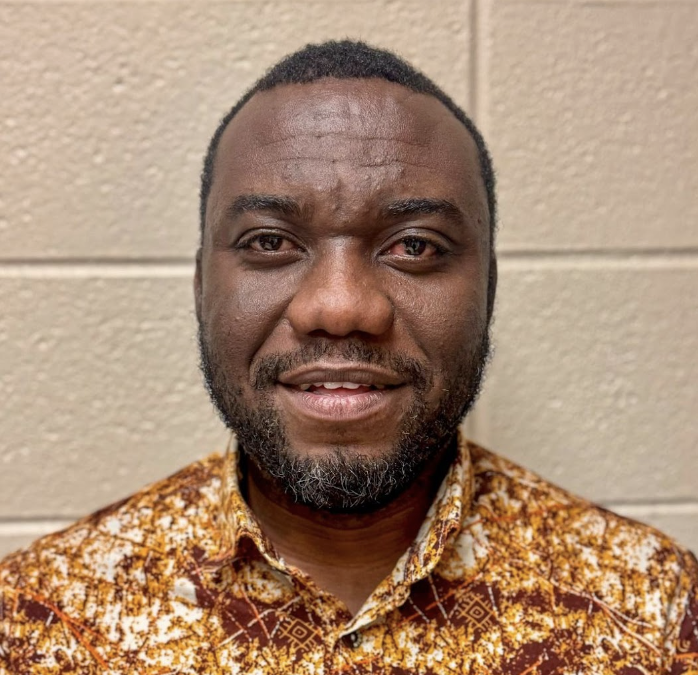Please describe yourself in a few sentences. What do you do/study and what are your passions?
I am Ernest Kofi Agorde, a doctoral student in Health Communication at Indiana University Purdue University Indianapolis (IUPUI) and an Associate Instructor of Fundamentals of Speech Communication. I have over a decade of experience in communication, public relations, and media, including previously working as a Junior Assistant Registrar in the Public Affairs directorate of the University of Cape Coast in Ghana, (and I am) an accredited Public Relations professional. I hold a M.Phil. in Communication Studies with a specialization in Public Relations and Broadcast Journalism from the University of Ghana, and a B.A. in Philosophy and English Language from the University of Cape Coast. My research interests center around the role of communication in reducing noncommunicable diseases and health seeking behaviors. When not engaged in academic pursuits, I enjoy athletics, football, movies, and I am a passionate Manchester United supporter.
For the 2024 Comm Day presentation you offered, on what did you speak?
My presentation was on examples of how music has been used in development efforts in Ghana and Africa. Specifically, I presented that music serves as a tool for development in Africa and Ghana. Musicians have used their platforms and lyrics to raise awareness and educate the population about corruption, poverty, social inequality, importance of education of the girl-child and health issues.
When it comes to the connection of music to social change, what are a few insights you might share? Are there any musical artists today or historically who you believe also speak to the transformative power of music? Please explain.
Musicians have used their platforms as resistance to oppression by military regimes as in the case of musicians like Fela Kuti and Ebow Taylor who used afrobeat to critique government and address social issues in Nigeria (Ofosu Asare, 2023); provide political commentary and critique economic mismanagement and hardships of citizens though the use of satire, and direct messages to challenge political leaders and systems. For example, Sarkodie (Apple Music, Spotify), one of the popular Ghanaian musicians sang Dumsor (dum= off and sor= on; referring to the turning on and off of the light in the Ghanaian language, Twi) to comment on irregular electricity in Ghana and its effects such as loss of jobs, loss of Ghanaian lives due to lack of electricity at the hospitals and called on the organization responsible and government to take action to solve the problem to reduce further damages. He also composed The Masses, which sort to criticize government of the time over the economic hardships of Ghanaians and advised the youth to vote wisely in the upcoming elections (2016 General elections). Whether by coincidence or an effect of this song, the government at the time this song was composed, was voted out of power in the general elections later that year.
Music is used by political parties in Ghana to market their candidates and sell their message to voters. Since 2000 when the major political parties campaigned to elect a new leader for the country after the end of Flt Lt Jerry John Rawlings’ term, political parties have use music to market their candidates and sell their message to the masses. Examples include the New Patriotic Party campaign song for Nana Akufo Addo and the National Democratic Congress song for John Dramani Mahama. These songs inform voters about the achievements of the parties, qualities of the candidates and their manifesto promises for the country when they are elected back to office.
Another popular Ghanaian musician, Stonebwoy (Apple Music, Spotify) has also collaborated with international organizations as a Sanitation Ambassador to use his influence and music to advocate “challenge the youth to be sanitation ambassadors wherever they find themselves, as well as help to keep leaders accountable to providing access to sanitation for those who need it most” (Global Citizen). He also serves as a role model by leading and taking part in clean up exercises in his community.
Finally, during the COVID-19 pandemic, music played a crucial role. Through collaborations with international agencies such as USAID, and COVID-19 Communication network, musicians such as Kofi Kinaata, and Celestine Donkor used music and the local Ghanaian languages to educate Ghanaians and create awareness about the COVID-19 restrictions and advocated for compliance with the safety protocols. Kofi Kinaata’s (Apple Music, Spotify) song has subtitles in English and is therefore also relevant to those who are not Ghanaians but are interested in knowing about music of Ghanaian origin’s contribution to COVID-19 awareness.
All these provide a glimpse of the power of music in contributing to social change at the national and international level.
